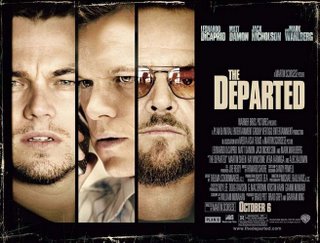Review: The Departed
 There's a reason why Martin Scorsese is Earth's greatest living filmmaker. For now, it's called The Departed. In a few years it'll probably be called Silence - his purported next project, a tale of trouble in feudal Japan, and his most radical departure since Kundun- and then cower before Deed Poll following his proposed Roosevelt biopic; which again pairs him with recent bell-ringer Leo DiCaprio. The point which I'm basely trying to make is that Scorsese's career continues to be one of constant and endless re-invention: instinctively transcendent of hammy genre trappings, and whilst most of his oeuvre is riddled with angsty Catholicism and subsequently deep-rooted existential fissures, they manifest themselves in both bloody gangster sprawls and charged period drama. Yet it's the former for which this Italian-American Oscar-dodger and sometime documentarian will be remembered for. It's both a blessing and curse.
There's a reason why Martin Scorsese is Earth's greatest living filmmaker. For now, it's called The Departed. In a few years it'll probably be called Silence - his purported next project, a tale of trouble in feudal Japan, and his most radical departure since Kundun- and then cower before Deed Poll following his proposed Roosevelt biopic; which again pairs him with recent bell-ringer Leo DiCaprio. The point which I'm basely trying to make is that Scorsese's career continues to be one of constant and endless re-invention: instinctively transcendent of hammy genre trappings, and whilst most of his oeuvre is riddled with angsty Catholicism and subsequently deep-rooted existential fissures, they manifest themselves in both bloody gangster sprawls and charged period drama. Yet it's the former for which this Italian-American Oscar-dodger and sometime documentarian will be remembered for. It's both a blessing and curse.With some diffidence, then, we approach The Departed - not only a 'return' to the well-tread mean streets, but also with the added stigma of being smacked with the remake stick. This is of course is not a virginal thing for Scorsese (he eloquently updated J. Lee Thompson's Cape Fear in 1991) but subsuming the poetic Hong Kong verve of slick-as-you-like Infernal Affairs with a quasi-Bostonian underworld is a potentially fatal choice. Don't heed these warning signs. They're infantile and disreputable. If you think a sexagenaric auteur who's had a dodgy decade can't make Dropkick Murphys covering Woody Guthrie work, you're gravely mistaken. He'll even make it a frequent cue.
The Departed is about as subtle as genocide. It's an extreme, pervasive, meditation on crime and law enforcement and the grey in-between. Any idiot could you tell that. But it's also an extremely entertaining meditation, one which screams out for commercial approval -or the approval of the Academy?- amid the dizzying stylistic verité that punctuates the entire picture. This isn't Scorsese being lazy, it's just this particular story calls for less moralistic inclination than Raging Bull and, to a lesser extent, Goodfellas because of the sheer weight of plot and the paunch of Jack Nicholson. The "even keel" between truth and duplicity Vera Farminga's character talks about is one Scorsese works hard to retain. So Nicholson might dust his floozies liberally with cocaine and spook Matt Damon with a dildo, but paradoxically it's with restraint. Or at least Smilin' Jack is countered by a knowingly idiosyncratic screenplay with an intrinsically starry ensemble to boot.
The same can't be said for the sporadic narrative; the thread of which pits undercover romanticist cop Billy Costigan (DiCaprio) against the functional bastard-of-sorts mole Colin Sullivan (Damon) with disastrous results for the pair. But that's largely inconsequential as the film brims with such heartfelt ingenuity (I really cannot subscribe to the elitist theory Scorsese's become emotionally detached over the years) and its seeming simplicity wisely mimics both Michael Mann's cleaner Heat and its stylised Chinese precursor while ignoring the gentle compulsion of blind exposition. In fact, taken as a whole, The Departed houses such consistent guttural intensity, we all breathe a sigh of relief when Alec Baldwin's Ellerby casually summarises and dismisses one of the film's several McGuffins with, "I don't know what it is, you don't know what it is, who gives a fuck?".
It won't come as much of a surprise that Martin Scorsese feels the same way.

I really need to see this. your writing is uniquely compelling, as always. great review.
Posted by Anonymous |
11:32 PM
Anonymous |
11:32 PM